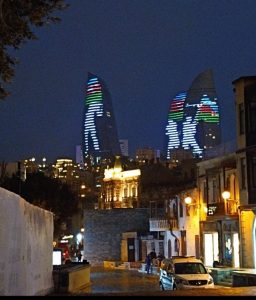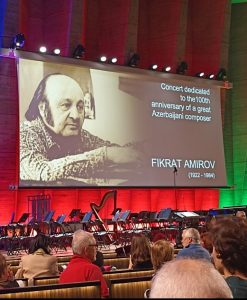Azerbaijan has long used soft power to avoid isolation on the international scene and consolidate its ambitions as a significant regional power. But, at a time when the tipping of the geopolitical balance is leading to fears of authoritarian drifts of military force, is Baku’s use of “yumşaq güc” really effective?
 A theoretical concept referring to the “ability to make others want the same thing as you” (Joseph Nye, 2004), soft power uses various resources (cultural attractiveness, lifestyle, sporting reputation, etc.). It is, by definition, opposed to hard power based on the army’s strength. It appears to be a complementary element of influence used by forces deemed ‘non-democratic.’
A theoretical concept referring to the “ability to make others want the same thing as you” (Joseph Nye, 2004), soft power uses various resources (cultural attractiveness, lifestyle, sporting reputation, etc.). It is, by definition, opposed to hard power based on the army’s strength. It appears to be a complementary element of influence used by forces deemed ‘non-democratic.’
Azerbaijani soft power or the logic of the window of opportunity
The victory of Azerbaijani military modernization in Nagorno-Karabakh in 2020, but even more so the Azerbaijani aggressions of September 2022 in uncontested Armenian territory seem to be in total contradiction with the concept of soft persuasion that Baku promotes, especially on the European continent, where the Armenian diaspora is consistent. But if one considers soft power a subsidiary tool to military force, the export of the Azerbaijani political-cultural model becomes clearer. This instrument of influence is an extension of a non-isolationist strategy aimed at opening Azerbaijan to the many political-economic opportunities offered by Europe and strengthening the communication mechanism to counter the attacks of the Western media (which present Azerbaijan mainly as an authoritarian oil state). However, in the face of costly and risky military options, soft power can appear cheap. Moreover, if the immediate environment of Azerbaijan, influenced by the historical Turkish-Persian presence, makes it more difficult for Baku to promote an attractive soft power, Europe, on the other hand, less familiar with this history, can appear as an ideal destination for this soft strategy.
Evidence of strong political will
The prestige Azerbaijan strives to acquire outside its borders is based, above all, on a communication strategy supported by the state authorities. The Heydar Aliyev Foundation, which has been operating since 2004 under the aegis of the country's vice-president and First Lady Mehriban Aliyeva, has distinguished itself, for example, through its participation in the restoration of Strasbourg Cathedral and monuments in the Palace of Versailles. In recent years, she has also helped to modernize several educational institutions in Russia and the Netherlands. More recently, its influence has spread through the Association of Friends of Azerbaijan (AAA) based in France, which, during the days devoted to the International Village of Gastronomy in Paris at the beginning of September, distributed free bags in the name of the foundation in exchange for the purchase of local food products, revealing a barely concealed financial dependence. Baku's soft power is capable of unexpected openness on the religious front. Thus, the foundation and Cardinal Gianfranco Ravasi signed an agreement on the restoration funds dedicated to the Roman catacombs while simultaneously participating in the restoration of the tombs of Saints Marcellin and Peter. University partnerships are another boon to state activism: opportunities for European students to study in Azerbaijan and return to their home countries with a positive outlook on their host country have increased in recent years. René van der Linden, Honorary President of the Parliamentary Assembly of the Council of Europe, appears on the Ada University (Baku) academic board, whose senior rector is none other than the former Azeri Deputy Foreign Minister, Ambassador Hafiz Pashayev. On a smaller scale, the IRS-Heritage, a publishing house offering free access to numerous books and reviews, has been promoting a very Jacobin vision of the country's history and culture to the student public for the past fifteen years, defending in various European languages (Italian, Spanish, French, etc.) an approach centered on the sovereignty of the state and the centralism of power. Azerbaijan can boast a genuine culture (way of life, religious beliefs, arts, and literature), which does not need propaganda to interest Europe. This can be expressed, in particular, in specific working-class neighborhoods where the perception of a Caucasian warrior mentality (literary legends, the exploits of some sportsmen such as the MMA wrestler Rafael Fiziev, etc.) offers Europeans of Azeri origin the possibility of claiming to belong to a determined, courageous and loyal community. On a broader scale, the first European Games in Baku in 2015 allowed Azerbaijan to connect politically with Europe. Its geographical belonging to this continent remains ambiguous, thanks to the organization of the largest multi-sports event in its history. At the cultural level, the Azerbaijani film day (relayed in particular by French institutes) and the Eurovision victory in 2011 serve as transformative tools, allowing Azerbaijan to display the power of its music and sport and to erase its image as an authoritarian and corrupt oil state.

The centenary of the birth of the composer Fikret Amirov was celebrated in 2022. At a concert organized at UNESCO, the French public discovered the combination of orchestral modernity and instrumental tradition of the famous Azerbaijani composer (photo by the author, 3 November 2022, UNESCO, Paris).
Nagorno-Karabakh could be the last non-coercive dimension exploited by Azerbaijan in its quest for influence in Europe, combining both natural potential and political activism: from the rubble of the fratricidal and now falsely frozen conflict around this enclave claimed by Armenia could emerge significant socio-economic opportunities, particularly in terms of tourism, with the possible arrival of a new European public coming to admire the natural beauty and historical wealth of this highly symbolic space in regional history. Within the framework of the Show Me Azerbaijan project, which took place at the end of November 2022, a group of foreign bloggers (notably European) had the opportunity to visit the Nagorno-Karabakh region (cultural sites, natural beauty, etc.). This initiative, supported by the Azerbaijan Tourism Agency, is part of an attempt to attract foreign visitors and defend the local cultural heritage. The bloggers' videos posted following the previous edition (May June 2021) were viewed by several thousand people, proving the effectiveness of such a communication campaign. This new Western tourism is based on “profitable antagonism”(1), i.e., the creation of a “soft” potential supported by the strength of the “hard” instrument. The originality of this approach lies in the fact that this tourist renaissance is taking place even though the conflict is not yet over, as shown by the sporadic continuation of border bombings.
Obstacles that can be overcome in the long term?
For Western Europe, political conservatism and the preservation of religious traditions increasingly embody outdated values, too far removed from the fight for gender equality, the defense of freedom of expression, or the battle for LGBTQIA+ rights. Nevertheless, building on its successful anti-corruption record and extending its human rights reforms, Azerbaijan could emerge as a modernizing partner.
However, the difference between what is projected in Europe and what prevails within national borders constitutes a severe limit to Azerbaijani soft power. For example, young Azerbaijani society finds it difficult to launch itself into the future of a country that is still plagued by severe infrastructure problems (barely 1% of GDP is devoted to transport infrastructure), salary inequalities (women’s salaries are still much lower than men's for equivalent positions) and whose capital, despite its role as a showcase, is struggling to exert the same attractiveness as other large Western cities. On the other hand, sports competitions and urban projects can certainly create hope for a future-oriented toward development. Still, in the game of soft power balance (university rankings, luxury industry, etc.), the balance is tipped more toward Brussels than Baku.
Finally, forced soft power, or Baku’s attempt to coax influential European politicians (luxurious gifts, corruption...) to find internal support, is risky and does not yield conclusive results. This Kürü diplomatiyası (caviar diplomacy) remains contrary to European values and gives the image of a rogue state ready to do anything to achieve its ends. The conviction for corruption and money laundering of the former leader of the European People’s Party group in the Parliamentary Assembly of the Council of Europe, Luca Volontè, against the background of his support for Azerbaijani representatives, embodies the limits of such an approach.
Although Azerbaijan’s attractive potential is undeniable, this country remains an exotic place for Europe, where corruption, arbitrary arrests, and nepotism are practiced. The achievements of the last few years are still insufficient to speak of significant influence, but it is clear that Azerbaijan’s soft power has moved from the shadows into the light. It has been supported for several months by European realism, which has been asked to find alternative sources to Russian hydrocarbons. However, Baku’s aggressive military policy, unburdened by its successes in the autumn of 2020, could be in violent contradiction with its efforts to seduce European countries.
Note:
(1) Adam Weaver, “Military tourism,” in J. Jafari & H. Xiao (ed.), Encyclopedia of Tourism, Springer, Cham., pp. 1-2, January 2014.
Thumbnail: Kichik Qala, downtown Baku, 14 February 2022 (© Duncan Labadie).
* Duncan Labadie holds a Master’s degree from the Moscow Institute of International Relations (MGIMO, specializing in the Eurasian region). He is preparing an M2 in International Relations at INALCO and the MEAE’s Orient competition.
Link to the French version of the article
Translated from French by Assen SLIM (Blog)
